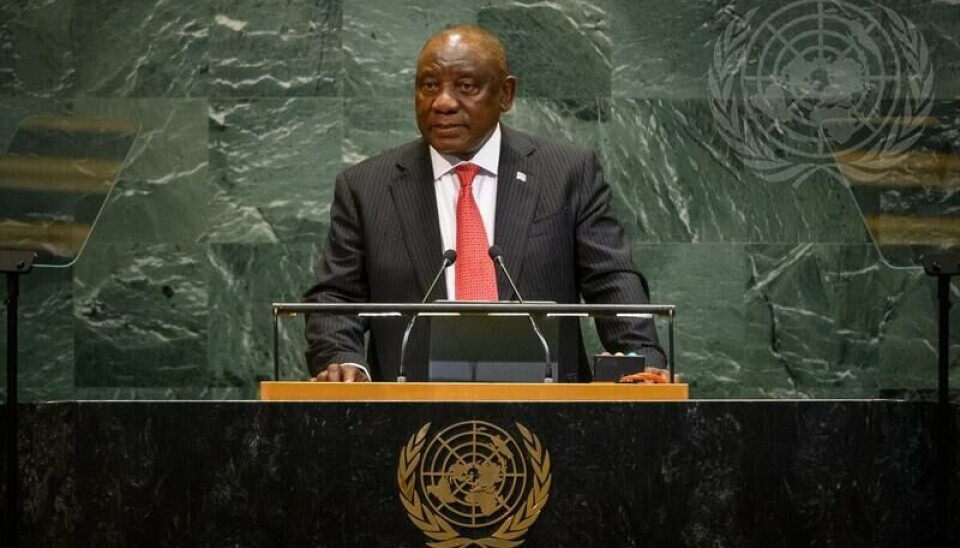Copyright : Re-publication of this article is authorised only in the following circumstances; the writer and Africa Legal are both recognised as the author and the website address www.africa-legal.com and original article link are back linked. Re-publication without both must be preauthorised by contacting editor@africa-legal.com
Leaders call for greater voice for Africa and Global South among UN reforms to reflect modern world

South African President Cyril Ramaphosa and Nigerian President Bola Tinubu were among many African and global leaders at the 80th session of the UN General Assembly in New York to call on the United Nations to overcome ‘systemic problems’, reform the Security Council, and restore trust in international institutions
Our global rules-based system is profoundly fragile and under growing scrutiny as the United Nations (UN), which since its establishment in the wake of the Second World War has sought to maintain peace and bring nations together, struggles to deliver on its mandate, says President Cyril Ramaphosa of South Africa.
Ramaphosa was one of many African and global leaders attending the 80th session of the UN General Assembly in New York last week to call for reform at the global body in the face of several pressing failures, from worsening global conflicts, underfunding of peacekeeping operations, retreating global health financing, and the intransigence of the permanent members of the UN Security, to the lack of voice for Africa and the wider Global South, and inadequate action on climate change.
"The message South Africa takes to this year's General Assembly is that if the organisation is to remain relevant, and if the global, rules-based system is to endure, the UN must demonstrate in both word and deed that multilateralism is alive,” said Ramaphosa earlier in the week. “Despite its many challenges, the UN remains humanity's best chance at peace, security and sustainable development for all.”
South Africa was among many nations at the 80th General Assembly calling for prompt reform to the UN Security Council to better reflect today’s global realities, and pushing for a more democratic, representative, and inclusive body overall.
"The current composition of the UN Security Council and its record of decisions seriously undermine the spirit of global cooperation and weaken the UN's commitment to neutrality and its legitimacy," warned Ramaphosa
He noted the five permanent Security Council members - the UK, China, France, Russia, and the United States - make decisions on behalf of the majority of the world and “continue to use their veto powers to paralyse collective action and prevent timely responses to crises, even in the face of clear violations of international law”.
He pointed to the crisis in Gaza, noting both Africa and South America remain without permanent representation on the Security Council despite their global role.
Annalena Baerbock, President of the General Assembly, said the UN Charter remains relevant, but only if member states have the will to respect it, and admitted the UN as an institution must undergo a ‘renovation’ to cope with contemporary crises.
In a national statement delivered by Vice President Kashim Shettima on Wednesday, Nigerian President Bola Tinubu called for Nigeria to have a permanent seat on the UN Security Council, while noting that Nigeria’s massive growth and evolution since the UN was first established in 1945 clearly tells the story of a changing world.
“When the UN was founded, we were a colony of 20 million people, absent from the tables where decisions about our fate were taken; today, we are a sovereign nation of over 236 million, projected to be the third most populous country in the world, with one of the youngest and most dynamic populations on earth,” said Tinubu.
“A stabilising force in regional security and a consistent partner in global peacekeeping, our case for a permanent seat at the Security Council is a demand for fairness, for representation, and for reform that restores credibility to the very institution upon which the hope of multilateralism rests.”
Nigeria receiving a permanent seat on the Security Council should take place as part of wider institutional reform to strengthen prospects for peace, development and human rights, said Tinubu. Urgent action also needs to be taken on sovereign debt relief and access to trade and financing, countries that host minerals must benefit from them, and the digital divide must close. “AI must stand for ‘Africa Included’.”
Speaking the following day, several other African leaders delivered a resounding, unified message: the UN must undergo meaningful reform, and the global order must be reshaped to ensure fairness, equity, and representation for all nations.
President Umaro Sissoco Embaló of Guinea-Bissau stressed the UN’s unique role as a forum where all nations can speak as equals, and also called for the Security Council to expand, democratise, and offer a genuine place for the Global South. He argued faith in multilateralism can only be rebuilt if developing nations see their voices shaping decisions. “The legitimacy, strength, and future of the UN lie in the inclusion and full participation of all of us in deliberations and decision-making.”
Ethiopia’s President Taye Atskeselassie Amde also called for reform, stating the UN must overcome ‘systemic problems’, including a lack of impartiality, selectivity, and double standards. He warned military buildups, isolationist policies, and retreat from development and climate commitments pose global threats that undermine peace, and pushed for debt cancellation and Africa’s full inclusion in global governance.
Vice President Josephine Joseph Lagu of South Sudan called for stronger commitment to African-led solutions, arguing that UN credibility hinges on supporting the most vulnerable. “We all know that it is better together. It is better together for us nationally, it is better together for us globally,” she said.
Drawing on Botswana’s experience of using diamond wealth to fund schools and hospitals, President Duma Gideon Boko of Botswana highlighted the fragility of resource dependence and need for global partnerships in renewable energy, technology, and sustainable agriculture. He also demanded a permanent Security Council seat for Africa; without it, the UN cannot claim to be truly universal.
